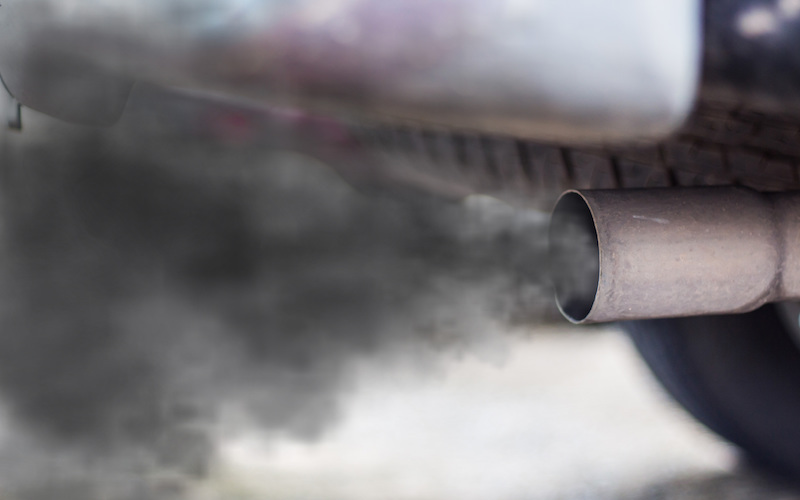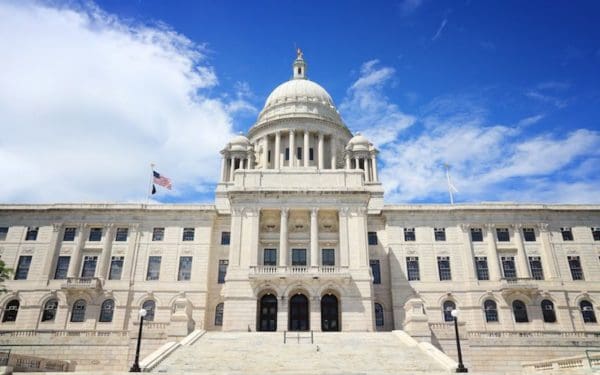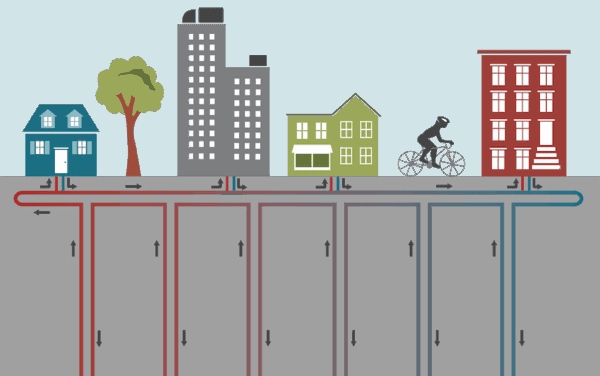
The pollution from cars, trucks, and buses is bad for our health and bad for the climate. Photo Credit: Shutterstock
Not far from the CLF office in downtown Boston, a crowd gathered on the basketball court of Josiah Quincy Upper School. As the heat shimmered off the pavement, we watched cars inch along the interchange between the Mass Pike and I-93. Idling in traffic, the tailpipe of each car, truck, and bus spewed tiny particles of pollution into the air around us. Standing for a handful of minutes on the same courts where schoolchildren play every day, we breathed in vast quantities of dirty air.
Here, CLF joined Boston City Councilor Michelle Wu, other advocates, policy makers, and community members to discuss the findings of a Union of Concerned Scientists report on how low-income and residents of color in Massachusetts are overburdened by air pollution. According to the report, not only are the emissions from cars and trucks among the worst for our health, but communities of color experience them at higher rates than their wealthier, white neighboring communities.
What’s more, the pollution emitted by those gas-guzzling vehicles that day was bad for our health and our climate. This is why the Commonwealth needs to slash climate-damaging emissions from our transportation system by boosting electric vehicles. By doing so, we can cut harmful emissions and improve the health of our communities, with particular attention to neighborhoods like Chinatown—which has the worst air quality in Massachusetts.
Pollution from Cars, Trucks, and Buses Threatens Public Health
Air pollution poses a serious threat to our health, and the emissions from cars, trucks, and buses are some of the most dangerous. The tiny particles released from tailpipes cause an estimated 3 to 4 million deaths worldwide each year. In Massachusetts, this pollution does not affect all communities equally. The Union of Concerned Scientists’ study shows that race is a major factor in determining how much we are exposed to air pollution.
The study found that people of color experience concentrations of air pollution 26% to 36% higher than white residents experience. And, more than 800,000 people of color live in areas where pollution is higher than the state average. This pollution triggers asthma attacks, worsens heart conditions, and has been linked to lung cancer and slowed lung-function in children. In Massachusetts, an estimated $1.9 billion in health costs in 2015 were linked to vehicle emissions, including premature deaths, heart attacks, emergency room visits, missed days at work, and asthma attacks. Chinatown, a community made up largely of Asian immigrants and Asian Americans in the heart of Boston, has the highest level of vehicle emissions in the Commonwealth.
Tailpipe Pollution Damages Our Climate
The International Panel of Climate Change’s October 2018 report made even the most vigilant of us all re-evaluate our outlook on climate change. It showed that an 80% reduction in emissions by 2050 is not enough to stop a drastic increase in global temperatures. Instead, we must adjust our target and work towards net-zero emissions by 2050. We only have a short window of time in which to make these adjustments. The transportation sector contributes the most climate-damaging emissions in the region, and tackling it must be a crucial part of our plan in the next decade.
That means we need urgent action to ramp up the number of electric cars, trucks, and buses on the road to combat the climate crisis.
Proposed Legislation Will Make More Cars, Trucks, and Buses Electric
In late July, the Massachusetts legislature held a public hearing on electric vehicle legislation. CLF offered testimony in support of several bills, one of which presents a critical next step to transitioning to a cleaner, more sustainable transportation system.
The bill (House Bill 2872 and Senate Bill 1927) is called “An Act to Promote the Transition to Clean Transportation Fleets.” As proposed, the law will require that vehicle fleets—for example, school buses or public transit vehicles—are completely electrified by 2035. It will also require that 100% of new vehicles purchased by the Commonwealth itself be zero-emission vehicles by 2026. By targeting vehicle fleets, the legislation addresses some of the cars, trucks, and buses that travel the most and have the highest levels of turnover.
The law will also help address some of the inequities in air pollution exposure. Use of zero-emission vehicles would be prioritized for environmental justice communities—the communities of color, immigrant communities, and low-income communities that disproportionately suffer the harms from transportation emissions. Many residents of environmental justice communities rely on public transit buses, which idle in their neighborhoods polluting the air. This bill would focus on replacing these diesel buses with electric models.
We Must Move Urgently to Protect Public Health and Battle the Climate Crisis
Although electric cars sales have been increasing over time, the overall adoption rate has been slow. In 2018, only 2.53% of all vehicles sold in the state were electric. Massachusetts has not done enough to boost their adoption to a level that will move us toward a clean, sustainable, and equitable transportation system.
Bills like the one currently under consideration help us jumpstart a transportation system which will one day run entirely on clean energy. Not only will it help lower climate-damaging emissions, but it will also reduce air pollution from cars, trucks, and buses in overburdened communities. In a state with some of the highest asthma rates in the country, helping our children and families breathe a little easier can only be a good thing.
CLF has asked the Joint Committee on Telecommunications, Utilities, and Energy to vote this bill favorably out of committee so that it can move on to become state law. Readers interested in promoting this legislation are encouraged to call and write to their state representatives and senators to express support.
Join CLF in support of issues you care about by signing up to receive CLF emails. You’ll be the first to know when and how you can make a difference for your community and for New England.



